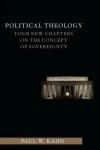
Kahn’s book is intriguing and in many places insightful, conversant in theoretical literature ranging from that of Giorgio Agamben to that of Brian Leiter. I have two worries, one about Kahn’s similarity to Schmitt and another about Kahn’s difference from Schmitt. I worry that the richness of Schmitt’s treatment of theology is diminished in Kahn’s treatment, with theology being reduced to religion – religion that sounds quite liberal and quite Protestant. And I worry that Kahn, like Schmitt, may not provide sufficient space for difference (racial, gender, class, and even religious) in his constructive account. I will approach these worries indirectly, after first rehearsing some of Kahn’s discussion of sovereignty.
As it is, much scholarship associated with political theology has been captured by the same fantasy that animated the 9/11 attacks. It is a very white, very male, very Western fantasy, one that is taken too literally by foreign subjects of American hegemony who have gone astray. There is such a thing as Sovereignty, which can be wielded by a Dictator or embodied in a People or hidden in Capital or represented in Towers. The goal is to defend It, or capture It, or displace It, or pluralize It, or expose It, or destabilize It – or, quintessentially for the academic, interrogate It.